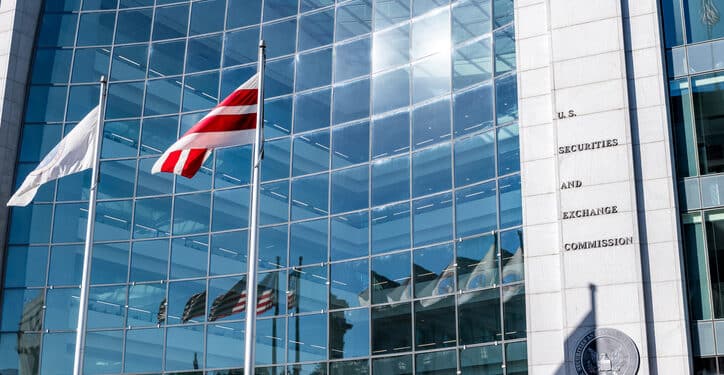On January 19, the U.S. Securities and Exchange Commission (SEC) announced that three whistleblowers who provided “information and assistance” that “led to a successful enforcement action” will receive $18 million.
Through the SEC Whistleblower Program, the SEC pays monetary awards to individuals who voluntarily disclose information that leads to a successful enforcement action. These awards are for 10-30% of the sanctions collected in the successful action.
According to the award order, three whistleblowers will receive the $18 million award, while one individual’s award claim was denied. One whistleblower accepted the award determination, while the three other applicants “filed timely responses contesting the Preliminary Determinations” made by the Claims Review Staff (CRS). The CRS then “confirmed its original recommendations” after reviewing the individuals’ arguments.
All individuals mentioned in the award order filed their whistleblower claims on time. The CRS’ Preliminary Determinations deemed that three whistleblowers “voluntarily provided original information to the Commission that led to the successful enforcement of the referenced Covered Action.” The CRS denied an award to the fourth individual because they “did not provide original information that ‘led to’ the success of the Covered Action as required under Exchange Act Rule 21F-4(c).” Additionally, the CRS decided that this individual “ is not eligible for the automatic waiver under Exchange Act Rule 21F-9(e) in connection with Claimant 4’s failure to submit information in the form and manner required under Exchange Act Rules 21F-9(a) and (b).”
Some of the claimants who did receive awards submitted written responses to the Preliminary Determinations. Claimants 2 and 3 argued that they should receive higher awards than doled out in the Preliminary Determinations, while Claimant 4 argued that they should receive a whistleblower award.
The award order breaks down how the CRS analyzed each individual’s claims:
- Claimant 1 provided information that “alerted Commission staff to the fraudulent scheme alleged in the Covered Action, and was the main basis for opening the investigation that resulted in the Covered Action. Claimant 1 provided Enforcement staff with detailed and highly significant information that advanced the staff’s investigation, saved considerable Commission time and resources, and had a significant impact on the overall success of the enforcement action. Claimant 1 also provided ongoing assistance by, among other things, participating in voluntary interviews and providing supporting documents to the staff.”
- Much of Claimant 2’s “information was duplicative of information first provided by Claimant 1, Claimant 2’s information included new information relating to certain charges filed in the Covered Action. Claimant 2’s assistance consisted of a voluntary interview and providing documents to the staff. Overall, Claimant 2’s contribution was significantly less than the contribution of Claimant 1, whose information was the main cause of the staff opening its investigation and was provided earlier in time.” Additionally, the CRS asserted that Claimant 2’s information “did not contribute to the staff’s opening of the investigation” and “Claimant 2’s overall contribution to the Covered Action was not as significant as that of Claimant 1.”
- “[M]uch of Claimant 3’s information was duplicative of information previously provided by Claimant 1 and Claimant 2” – however, “Claimant 3 provided limited new information that assisted the staff with respect to certain false statements alleged in the Covered Action. Any additional assistance by Claimant 3 was limited to providing documents and participating in an interview after the Covered Action was filed.” Due to other analysis, the CRS did not grant Claimant 3 an increased award amount.
- Claimant 4’s application for a whistleblower award was denied, with the award order stating that “most of the information provided by Claimant 4, which was provided after the opening of the investigation and after information was submitted by other claimants, was already known to Enforcement staff, and any additional information provided by Claimant 4 did not significantly contribute to the Covered Action.” Additionally, Claimant 4 did not “submit information in the form and manner required under Exchange Act Rules 21F-9(a) and (b), which require the submission of information on Form TCR or online through the Commission’s website, and that a whistleblower sign the required whistleblower declaration.” Instead, “Claimant 4 originally submitted information in an email and did not submit a Form TCR with the required whistleblower declaration until approximately two years later.”
In Fiscal Year 2022, the SEC “awarded approximately $229 million in 103 awards, making FY 2022 the Commission’s second highest year in terms of dollar amounts and number of awards,” according to the Whistleblower Office’s Annual Report to Congress.
The report also states that “Enforcement actions brought using information from meritorious whistleblowers have resulted in orders for more than $6.3 billion in total monetary sanctions, including more than $4.0 billion in disgorgement of ill-gotten gains and interest, of which more than $1.5 billion has been, or is scheduled to be, returned to harmed investors.”




